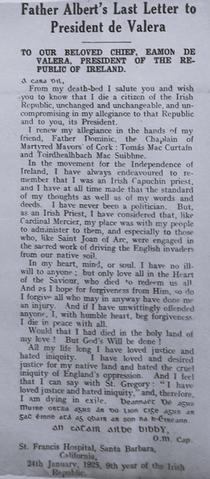Zone d'identification
Cote
Titre
Date(s)
- 24 Jan. 1925 (Création/Production)
Niveau de description
Étendue matérielle et support
1 p.; clipping
Zone du contexte
Nom du producteur
Notice biographique
Thomas Bibby was born on 24 October 1877 in Bagenalstown, County Carlow. He was baptised on 28 October 1877. His family were proprietors of a woollen mill at Greensbridge and operated two drapery establishments in Kilkenny City, one in Parliament Street and another on High Street. He entered the Capuchin novitiate at Rochestown on 7 July 1894 and took the religious name of Albert. He was solemnly professed on 8 May 1900 and was ordained a priest at St. Mary of the Angels, Church Street, Dublin, on 23 February 1902. A gifted scholar, Fr. Albert was among the first batch of Capuchin students to receive a BA degree from the Royal University. He later became a professor of philosophy and theology and taught these subjects to Capuchin students for some years after his ordination. One of his first students was Fr. Dominic O’Connor OFM Cap. Fr. Albert was active in the Gaelic revival movement and became a fluent speaker of Irish. He was also engaged in temperance advocacy and gave missions sometimes solely in Irish in Gaeltacht areas. He was also involved in the Columcille branch of Conradh na Gaelige in its early years. Briefly a part of the community of friars in Kilkenny, he moved to Church Street, Dublin, in the early 1900s. In the aftermath of the Easter Rising, Fr. Albert ministered to a number of rebel prisoners in Kilmainham Jail and in other locations. He was present at the execution of Seán Heuston on 8 May 1916 and wrote an account of his final hours. He was later a regular correspondent with prominent republicans and their relations. On 16 December 1920 both Fr. Albert and Fr. Dominic O’Connor OFM Cap. were arrested by British forces during a raid on the friary on Church Street. Fr. Albert was detained for some hours in Dublin Castle but was afterwards released whilst Fr. Dominic was sentence to five years’ penal servitude. When the Four Courts was attacked on 27 June 1922 in the opening engagement of the Civil War, Fr. Albert was present in the building alongside Fr. Dominic. Both priests remained with the Anti-Treaty irregulars until the Four Courts was evacuated. They then proceeded to administer to Cathal Brugha and other IRA men occupying the Hamman Hotel on O’Connell Street. In June 1924, Fr. Albert was sent to the United States and was eventually appointed Pastor of the Capuchin Mission at Santa Inez in California. He immediately set about restoring both the parish and the structures of the old Franciscan Mission. Modern plumbing and electricity systems were installed at Santa Inez and Fr. Albert was joined by Friars Reginald O’Hanlon and Colmcille Cregan. However, Albert’s health deteriorated and he was soon admitted to St. Francis Hospital in Santa Barbara County. He died on 14 February 1925, a mere three months after his arrival in Santa Inez. He was buried just outside the mission’s chapel. His remains (along with those of his former pupil Fr. Dominic O’Connor OFM Cap.) were later repatriated to Ireland and he was buried in the cemetery of Rochestown Capuchin Friary, Cork, on 14 June 1958.
Histoire archivistique
Source immédiate d'acquisition ou de transfert
Zone du contenu et de la structure
Portée et contenu
A clipping of an article reprinting a copy of Fr. Albert Bibby’s final letter to Éamon de Valera pledging his ‘unchanged and unchangeable, and uncompromising’ allegiance to the Republic and to you, its President’. He argues that ‘in the movement for the independence of Ireland I have always endeavoured to remember that I was a Capuchin Priest’. The volume also includes a covering letter from Fr. Dominic O’Connor OFM Cap. to de Valera enclosing Bibby’ letter and referring to the latter’s ailing health. O’Connor concludes by stating that it is ‘better to die in agony than for freedom than live in luxurious freedom’. (Volume page 116).

